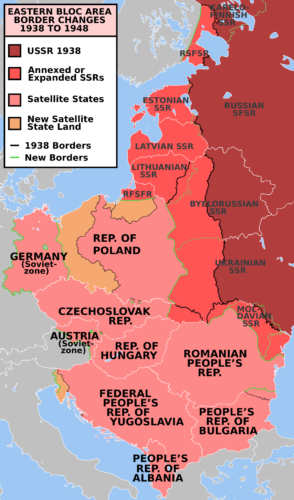West Berliners watch a Douglas C-54 Skymaster land at Tempelhof Airport, 1948, during the Soviet Berlin Blockade.
The Gehlen Organization (or Gehlen Group) was a Central Intelligence Agency (CIA) funded intelligence network that operated in post-war Germany. It was led by Reinhard Gehlen, a former Nazi general who had been in charge of spying on the Soviet Union during World War II. Gehlen was born in 1902 into a Protestant family with a military tradition. He joined the German army in 1920 and rose to the rank of lieutenant general. He became the head of the Foreign Armies East, or Fremde Heere Ost (FHO), the intelligence organization of the German High Command that gathered information about the Soviet forces on the Eastern Front. He was dismissed by Hitler in 1945 for his pessimistic reports.

Necessity Makes for Strange Bedfellows
After the war, Gehlen surrendered to the Americans and offered his services and his network of agents to them. He was taken to Fort Hunt, Virginia, where he was interrogated and debriefed by US intelligence officers. He convinced them that he could provide valuable information on the Soviet bloc and that he had contacts with anti-communist resistance groups in Eastern Europe. He also warned them of a possible “missile gap” between the US and the USSR. In July 1946, he was released from his official American custody and, along with 350 former German intelligence agents of his choosing, left for Munich and began staffing his organization.
He used a dummy corporation called the South German Industrial Development Organization as a cover to run his espionage network. He cooperated with the CIA after it was formed in 1947 and became their main source of intelligence on the Soviet bloc. The Gehlen Organization later became the basis for the Federal Intelligence Service, or Bundesnachrichtendienst (BND), the official foreign intelligence service of Germany since 1956.
As a result of his wartime position, Gehlen had connections with many former members of the German army, SS and Gestapo who had expertise on the Soviet bloc and shared his anti-communist views. He offered them a chance to continue their work as spies and to avoid prosecution or imprisonment for their war crimes. He also searched for potential recruits among the German POWs returning from Soviet captivity, who had valuable information on the Soviet Union.

Gehlen used his CIA funding and equipment to expand and improve his intelligence organization and its operations against the Soviet Union. He used the money to pay salaries, rent offices, and buy equipment. He also used his CIA resources to bribe, blackmail, or coerce potential sources, informants, or defectors in the Soviet bloc and to free some of his former Nazi colleagues who were imprisoned or wanted by the Allies for war crimes. He also used his CIA connections to obtain visas, passports, and cover identities for his agents and operatives.
The Soviet Union responded to Gehlen’s operations by trying to counteract, expose, and eliminate his spy network. The Soviet intelligence services were aware of Gehlen’s activities and his collaboration with the US. They considered him a dangerous enemy and a traitor to his country. They deployed their own agents and informants to infiltrate, sabotage, and assassinate Gehlen’s operatives and sources in the Soviet bloc. They also employed a program of propaganda, disinformation, and deception to undermine Gehlen’s credibility and reliability. They attempted to capture or kill Gehlen himself on several occasions but failed in their attempts to do so. The Soviet Union also protested against Gehlen’s organization and its use of former Nazis and war criminals to the US and its allies, but without much effect.
Debate & Controversy
The effectiveness of the Gehlen Organization was a matter of debate and controversy and remains so today. The US faced a major challenge in gathering intelligence on the Soviet Union after World War II. The Gehlen organization helped fill a pressing need by providing valuable intelligence on the Soviet Union and its allies. It became the eyes and ears of the CIA in Eastern Europe and the Soviet Union during the early stages of the Cold War. It also conducted covert operations against communist targets in Eastern Europe and elsewhere. It also contributed to the establishment of an independent and professional German intelligence service, the Federal Intelligence Service, which became a key partner of the CIA.

On the other hand, the Gehlen Organization was also plagued by many problems and failures. It relied heavily on former Nazis and war criminals, who were morally questionable and politically unreliable. It also faced strong opposition and resistance from the Soviet intelligence services, who tried to counteract, expose, and eliminate its spy network. It suffered from infiltration, deception, and manipulation by Soviet agents and informants, who compromised its security and credibility. It also boosted the propaganda efforts of the Warsaw Pact, who denounced it as a continuation of Nazi aggression and atrocities. It was never a good clandestine operator, nor was it a particularly good administrator. It lacked professionalism, discipline, and quality control and was plagued with internal conflicts and rivalries among its staff and operatives. It also failed to adapt to the changing political and technological environment of the Cold War.
*The views and opinions expressed on this website are solely those of the original authors and contributors. These views and opinions do not necessarily represent those of Spotter Up Magazine, the administrative staff, and/or any/all contributors to this site.

